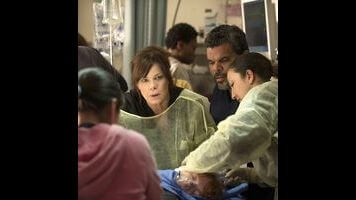In emergency room lingo, “code black” means all hell has broken loose. The phrase is used to jolt med-school students out of their rotation stupor when there’s a massive influx of critical patients and insufficient resources to care for them. Most emergency rooms have the good fortune to find themselves in code black situations no more than a handful of times each year. But Angels Memorial, the hospital at the center of CBS’ Code Black, declares such a state of emergency 300 times a year, according to a couple of helpful title cards. Sure enough, by the end of the pilot, the ER at Los Angeles’ Angels Memorial has plummeted into pandemonium, and Dr. Leanne Rorish (Marcia Gay Harden) is treating two patients at the hospital while talking an absent colleague through a procedure over the phone.
Code Black is nothing new. In fact, it’s as by-the-book as a medical drama can get, complete with Harden as the maverick who is happy to circumvent standard operating procedure if doing so will save a life, and Raza Jaffrey as her foil, the straitlaced Dr. Neal Hudson. Neal is none too pleased when Leanne saves a patient using a theoretical technique that has no track record of success in the real world, but Leanne has the last word when Neal mentions how disappointed the higher-ups will be with her unorthodox methods. “You’re the doctor they want; I’m the doctor they need,” says a self-satisfied Leanne.
The show is exactly as hackneyed as that line of dialogue makes it sound, but it’s also oddly comforting in a way that fits neatly into the CBS brand. From its unwavering commitment to multi-camera sitcoms to its spinoff-friendly whodunnit thrillers, CBS has built the largest network audience by paying tribute to the television of yesteryear. The characters aren’t especially complex or layered, the plots follow a narrowly defined template, and the chess board is reset at the end of each episode. CBS embraces the formulas the majority of the television industry have left behind in search of the next genre-bending game changer. The numbers don’t lie: Many people just want something to intently listen to and half-heartedly watch while they fold laundry. Code Black is one of those shows.
CBS’ appetite for quaintness usually works against its shows qualitatively, but Code Black gets a pass. It’s not the least bit interesting, but it’s dull and predictable in a way a medical drama hasn’t been in years. Specifically, Code Black is refreshingly unsexy. Shonda Rhimes built a television empire with Grey’s Anatomy, which was at one time revolutionary in the way it focused more on the romantic lives of the doctors than the maladies of the patients. But after 12 seasons of Grey’s and several failed attempts to reverse engineer its success, the sexy doctors concept has worn thin. Code Black isn’t that type of party. Head nurse Jesse Sallander (Luis Guzmán) tells the new crop of residents under his charge that under no circumstances is anyone to die while in the care of Angels Memorial. Meanwhile, romance is so dead at Angels, it has gone into rigor. Supply closets are used to store supplies, not as a secret rendezvous point for horny med students.
Because Code Black isn’t as interested in plumbing the personal lives of the practitioners, Angels Memorial looks and sounds like an actual hospital. The most important character at any given moment is the patient on the gurney. Creator Michael Seitzman will inevitably delve into the backstories of the characters, but the pilot tries admirably to kick that can as far down the road as possible. Code Black wants to be an unsullied medical drama for as long as possible, and while it will feel familiar to anyone who has ever seen ER, it will feel brand new to anyone young enough to have grown up in a world where hospital shows have three love scenes per episode.
Harden leads a tremendous, truly diverse cast representing a wide range of ages, races, and backgrounds. But they seem limited by the format. The downside of Code Black’s strict focus on the emergency room grind is that it too often feels like a re-creation of a Discovery Channel documentary rather than a scripted series with its own personality. But again, that’s part of Code Black’s charm. Like its rebellious lead character, Code Black flouts the rules and refuses to apologize for it.












![HBO teases new Euphoria, Larry David, and much more in 2026 sizzle reel [Updated]](https://img.pastemagazine.com/wp-content/avuploads/2025/12/12100344/MixCollage-12-Dec-2025-09-56-AM-9137.jpg)




























